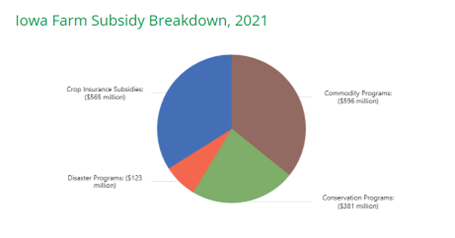Guide to Iowa Agriculture
Table of Contents
-
-
- Introduction
- Overview of Iowa Farming
- Iowa Agriculture Associations
- Farming Techniques
- Iowa Farming Environmental Impact
- Iowa Farming Seasons
- Challenges Facing Iowa Farmers
- Iowa Farming Research & Education
- Government Policies – Iowa Farming
- Iowa Farming – Additional Resources
- Iowa Farm Accounting Services
-
Introduction
Agriculture holds a position of great importance in Iowa, shaping its economy, culture and landscape. Known as the “Hawkeye State,” Iowa’s rich and fertile farmland has established it as a leading agricultural powerhouse within the United States. This page delves into the multifaceted world of agriculture in Iowa, shedding light on its significance, its challenges and the innovative practices driving its success.
Iowa’s agriculture industry is the backbone of its identity and prosperity. The state has become a key player in U.S. agriculture with millions of acres of arable land, favorable climate conditions and a robust agricultural infrastructure. The sector feeds the nation and contributes substantially to Iowa’s economy, job market and rural communities.
The primary aim of this content is to provide insights into various aspects of agriculture in Iowa. It covers topics such as the state’s agricultural landscape, the major crops and livestock, the role of technology and innovation, environmental impact, government support and research and education institutions. By offering this information, we seek to:
- Educate – Provide readers with a well-rounded understanding of the significance of agriculture in Iowa, its historical context and its evolving role in modern times.
- Inform – Explore the challenges and opportunities Iowa’s agriculture industry faces, from sustainable farming practices to environmental stewardship and policy implications.
- Highlight – Showcase the contributions of key organizations, educational institutions and government agencies that support and advance Iowa’s agriculture.
- Promote – Emphasize the importance of sustainability, innovation and responsible stewardship in Iowa’s agricultural practices and showcase how these principles can benefit farmers and the environment.
Overview of Iowa Farming
Farming and agribusiness are significant economic generators for the state, ranked ahead of the advanced manufacturing and renewable energy industries. There are currently over 84,900 Iowa farming businesses operating over 30 million acres. The most popular crops include corn with 12,900,000 acres planted, soybeans with 10,100,000 acres planted, oats with 130,000 acres planted and hay and alfalfa with 75,000 acres planted. In 2021, the state generated roughly $34.7B in agricultural cash receipts with the most valuable commodities including corn, hogs and soybeans. The industry provides Iowa residents with 325,828 direct jobs, $11.75B in direct wages, $4.80B in exports and creates $15.44B in state taxes.
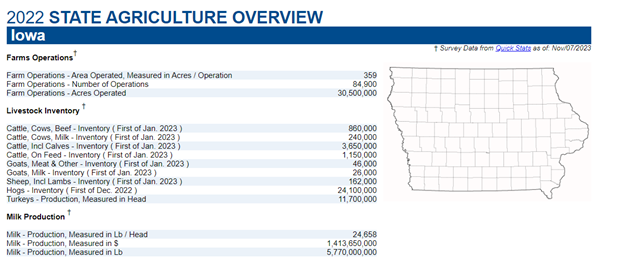
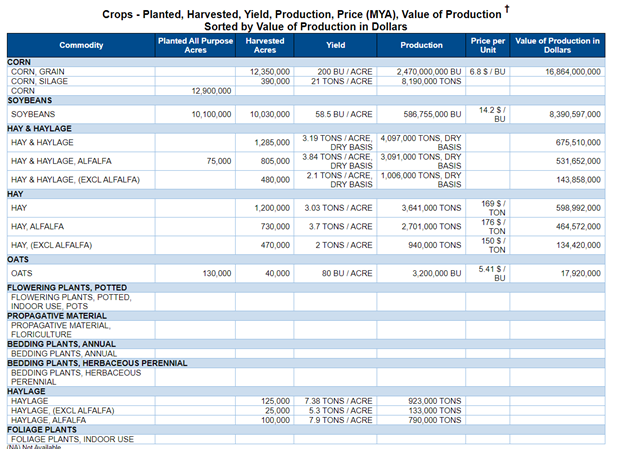
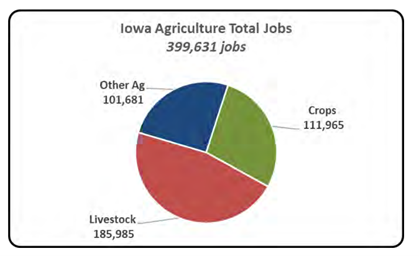 Source: Coalition to Support Iowa Farmers
Source: Coalition to Support Iowa Farmers
Iowa Agricultural Associations
Several business organizations, chambers and associations are focused on the farming and agribusiness industries. These groups offer access to various resources, events and programming to help propel farmers, ranchers and others forward. This includes the Iowa Corn Federation, Iowa Cattlemen’s Association, Iowa State Dairy Association, Iowa Soybean Association, Iowa Pork Producers Association and the Agribusiness Association of Iowa. These agricultural organizations in Iowa play crucial roles in representing and supporting farmers, promoting sustainable agricultural practices and advocating for policies that benefit the state’s agricultural sector. Below is additional information on each, including:
- Iowa Farm Bureau Federation (IFBF)
- Role – IFBF is a leading agricultural organization in Iowa, representing the interests of farmers and rural communities in the state.
- Contributions – IFBF plays a vital role in advocating for agricultural policy that benefits Iowa farmers. It offers resources, educational programs and insurance services to its members. The IFBF works to protect and promote the interests of Iowa farmers at both the state and national levels. It also supports rural development and sustainability initiatives.
- Iowa Corn Growers Association (ICGA)
- Role – ICGA is a grassroots organization that represents Iowa’s corn growers and advocates for the corn industry in the state.
- Contributions – ICGA focuses on policies and practices benefiting corn farmers, including supporting ethanol production and advocating for renewable fuels. The organization also invests in research to improve corn yields and sustainability. ICGA provides educational resources and networking opportunities to its members and actively participates in efforts to expand export opportunities for Iowa corn.
- Iowa Pork Producers Association (IPPA)
- Role – IPPA represents Iowa’s pork producers and promotes the pork industry within the state.
- Contributions – IPPA plays a significant role in advocating for policies that support the pork industry, including animal welfare and environmental regulations. The organization conducts research and provides resources to help pork producers improve their practices. IPPA also promotes pork consumption and exports, contributing to the economic well-being of Iowa’s pork producers.
- Iowa Soybean Association (ISA)
- Role – ISA represents soybean growers in Iowa and works to enhance the competitiveness and profitability of soybean farming.
- Contributions – ISA focuses on issues such as soybean research, market development and policy advocacy. The organization invests in research projects to improve soybean yields and sustainability. It also engages in efforts to expand international markets for Iowa soybeans and provides educational resources to help soybean farmers make informed decisions.
- Iowa Cattlemen’s Association (ICA)
- Role – ICA serves as the voice of Iowa’s cattle industry, advocating for the interests of cattle producers in the state.
- Contributions – ICA engages in policy advocacy on issues relevant to the cattle industry, such as livestock health, animal welfare and market access. The organization offers educational programs and resources to help cattle producers enhance their operations and stay informed about industry developments. ICA also fosters networking and collaboration among cattle producers.
Farming Techniques
Iowa is at the forefront of modern agricultural practices, employing a range of techniques to optimize crop production while also focusing on sustainability and environmental stewardship. Here are some common farming techniques used in Iowa:
- No-Till Farming – This involves planting crops without tilling or plowing the soil. This reduces soil erosion, conserves moisture and improves soil structure. No-till practices help protect Iowa’s rich topsoil.
- Cover Crops – These are planted in the offseason to cover the soil surface. They help prevent erosion, improve soil health and capture excess nutrients. Common cover crops in Iowa include rye, oats and clover.
- Precision Agriculture – This method uses technology like GPS-guided tractors and drones to optimize planting, fertilization and irrigation. These tools help farmers make data-driven decisions and use resources more efficiently.
- Crop Rotation – This is a common practice in Iowa’s farming. Farmers alternate the types of crops they plant in a specific field over several years. This helps break pest and disease cycles, improves soil health and maintains nutrient balance.
Technology Impact on Farming Techniques
Technology and innovation have played a pivotal role in shaping and advancing Iowa’s agriculture industry. Iowa is often referred to as the “Silicon Prairie” due to its significant contributions to agricultural technology and innovation. Here are some ways in which technology and innovation impact agriculture in Iowa:
-
-
- Biotechnology – Iowa is a leader in biotechnology, particularly in the production of genetically modified crops. Biotech innovations have led to the development of pest-resistant and herbicide-tolerant crops, which can increase crop yields while reducing the need for chemical inputs. This technology has been especially important for Iowa’s corn and soybean farmers.
- Plant Breeding and Genetics – Research institutions and companies in Iowa invest in plant breeding and genetics to develop new crop varieties that are more resilient to pests, diseases and environmental stressors. These innovations help farmers adapt to changing climate conditions and improve crop yields.
- AgTech Startups – Iowa has a growing ecosystem of agricultural technology startups. These companies develop solutions ranging from farm management software and automation tools to robotics and autonomous machinery. These innovations help farmers streamline operations, reduce labor costs and increase efficiency.
- Data Management – The collection and analysis of farm data have become increasingly important in modern agriculture. Iowa farmers use data management systems to monitor crop performance, track inputs and make informed decisions about planting, fertilization and harvesting. Data-driven insights contribute to more sustainable and profitable farming practices.
- Sustainable Farming Practices – Iowa’s agriculture industry is adopting sustainable farming practices, thanks to technological advancements. This includes the implementation of conservation practices such as no-till farming and cover cropping which help reduce soil erosion and improve soil health. Sustainable practices are not only environmentally responsible but also help farmers maintain long-term productivity.
- Renewable Energy – Iowa is a leader in renewable energy, particularly wind energy production. The state produces the highest of electricity by wind of any state – 57%. Wind turbines on farms provide additional income for farmers through wind energy leases, and renewable energy contributes to reducing the carbon footprint of agriculture in the state.
Iowa Farming Environmental Challenges
- Soil Erosion – Iowa’s fertile topsoil is vulnerable to erosion due to factors like heavy rainfall, monoculture cropping systems and the removal of natural vegetation. Soil erosion can lead to the loss of valuable topsoil and sedimentation of rivers and streams.
- Water Quality – The runoff from agricultural fields can carry nutrients, primarily nitrogen and phosphorus, into water bodies. This runoff can contribute to water quality problems such as nutrient pollution, harmful algal blooms and impaired aquatic ecosystems.
- Pesticide Use – Pesticides, herbicides and insecticides are commonly used in Iowa agriculture to protect crops from pests and diseases. However, their use can have unintended consequences, including harm to non-target species and potential contamination of soil and water.
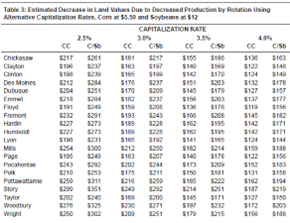
Source: Iowa State University Extension and Outreach
Conservation Efforts
- Conservation Practices – Iowa has made efforts to promote conservation practices such as no-till farming, cover cropping and buffer strips along waterways. These practices help reduce soil erosion, improve water quality and enhance soil health.
- Wetland Restoration – Wetland restoration projects have been initiated to naturally filter and retain nutrients, providing a buffer against nutrient runoff into water bodies.
- Nutrient Management – The state encourages farmers to adopt precision agriculture techniques and nutrient management plans to optimize fertilizer application, reducing nutrient overloading in soils.
- Conservation Reserve Program (CRP) – The federal CRP program incentivizes farmers to convert environmentally sensitive land to conservation practices, including grassland and wetland restoration, which can help reduce erosion and improve water quality.
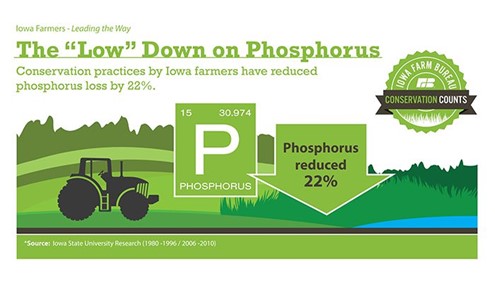
Sustainable Farming Practices
- Cover Crops – Farmers increasingly use cover crops like cereal rye and clover to protect and enrich the soil during the off-season and ultimately reduce erosion and nutrient runoff.
- Crop Rotation – Diversifying crop rotations can improve soil health and reduce the risk of pest and disease outbreaks.
- Precision Agriculture – Advanced technologies such as GPS-guided machinery and data analytics enable farmers to apply inputs more efficiently and reduce the overapplication of fertilizers and pesticides.
- Conservation Tillage – Reduced tillage and no-till practices help minimize soil disturbance, reduce erosion and improve water infiltration.
- Livestock Management – Sustainable livestock practices like rotational grazing and manure management aim to minimize environmental impacts associated with livestock production.
While significant progress has been made in adopting sustainable practices and implementing conservation measures, addressing environmental challenges in Iowa’s agriculture sector remains an ongoing effort. Balancing the need for agricultural production with environmental stewardship is a complex challenge, but continued collaboration between farmers, researchers, policymakers and environmental organizations is essential to achieve long-term sustainability and protect Iowa’s natural resources.
Iowa Farming Seasons
Iowa’s agriculture is significantly influenced by its distinct seasons. Each plays a crucial role in the planting and harvesting of various crops. Here’s an overview of the different seasons and their impact on Iowa agriculture:
Spring (March to May)
- Planting Season – Spring marks the beginning of the planting season in Iowa. As temperatures rise and the soil begins to warm up, farmers prepare their fields and plant crops like corn, soybeans, oats and early-season vegetables. The exact timing of planting varies depending on weather conditions and soil readiness.
- Challenges – Spring can bring unpredictable weather, including heavy rains, which may delay planting. Farmers need to carefully manage their planting schedules to optimize crop growth and yields.
Summer (June to August)
- Growing Season – Summer is the primary growing season in Iowa. Warm temperatures and ample sunlight promote the development of crops. Specifically, corn and soybeans experience significant growth during this time. Farmers spent a lot of time tending to their crops and monitoring for pests, diseases and nutrient needs.
- Irrigation – In some areas of Iowa, irrigation is necessary during dry spells to ensure adequate moisture for crops.
- Challenges – High temperatures and the occasional drought can stress crops, making it essential for farmers to manage irrigation and closely monitor crop health.
Fall (September to November)
- Harvest Season – Fall is the harvest season when farmers gather the crops they planted in the spring. Corn and soybeans are typically harvested during this time. The exact timing of harvest depends on the crop’s maturity and weather conditions. Some other crops such as oats and hay may also be harvested during the fall.
- Challenges – Farmers need to coordinate their harvesting activities carefully, especially as the weather begins to cool. Early frosts can damage crops so a quick harvest is necessary.
Winter (December to February)
- Dormant Period – Winter is a dormant period for most crops in Iowa. The cold temperatures and frozen ground make it unsuitable for planting or harvesting. Many farmers use this time for equipment maintenance, planning for the upcoming planting season and attending educational events or workshops.
- Challenges – While crop-related activities slow down during the winter, farmers must prepare for the next growing season, including selecting seeds, securing resources and fine-tuning their farming strategies.
Iowa’s agriculture industry relies on the cyclical nature of these seasons to maximize crop yields and ensure the health of their fields. The timing of planting and harvesting is important for optimizing crop growth and quality. Additionally, extreme weather events such as floods or droughts can disrupt the agricultural calendar, highlighting the importance of resilience and adaptability in farming practices.
Challenges Facing Iowa Farmers
Farmers in Iowa face a variety of challenges in maintaining profitable acreage that consistently produces, including:
- Market Price Volatility – The prices of agricultural commodities like corn and soybeans can be highly volatile, influenced by factors such as global demand, trade policies and weather conditions. This volatility can affect farmers’ income and profitability.
- Pest and Disease Pressure – Iowa’s diverse agricultural landscape is susceptible to various pests and diseases that can damage crops and reduce yields. Effective pest management and disease prevention are essential but can be costly and complex.
- Environmental Regulations – Government regulations aimed at protecting the environment and water quality can pose challenges for farmers. Compliance with nutrient management and conservation practices can require significant investments in time and resources.
- Land Degradation – Soil erosion and degradation are ongoing concerns in Iowa. The loss of topsoil affects long-term soil fertility and productivity, necessitating conservation efforts and sustainable land management practices.
- Labor Shortages – Finding and retaining skilled farm labor can be challenging, especially during peak seasons. Labor shortages can hinder farm operations and impact productivity.
- Weather Variability – Iowa’s climate can be unpredictable, with extreme weather events such as droughts, floods and severe storms impacting crop yields and livestock health. Farmers must adapt to these challenges through risk management strategies and resilient farming practices.
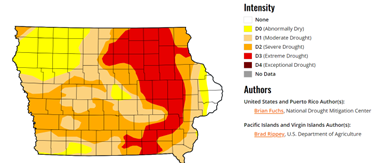
Source: US Drought Monitor
Opportunities for Growth and Diversification
-
-
-
- Value-Added Agriculture – Iowa farmers can explore value-added opportunities by processing raw agricultural products into higher-value goods. Examples include turning corn into ethanol, soybeans into biodiesel or specialty crops like fruits and vegetables into processed foods.
- Organic and Specialty Crops – There is a growing demand for organic and specialty crops including fruits, vegetables and niche products like organic meats and dairy. Farmers can diversify by tapping into these markets and commanding premium prices.
- Alternative Energy – Iowa is a leader in renewable energy production, particularly wind energy. Farmers can diversify their income by leasing land for wind turbines or investing in renewable energy projects on their properties.
- Local and Direct Marketing – Farmers can benefit from direct marketing initiatives, such as farmers’ markets, community-supported agriculture (CSA) programs and farm-to-table partnerships with local restaurants and businesses.
- Conservation Practices – Implementing conservation practices not only benefits the environment but can also qualify farmers for financial incentives, grants and cost-share programs designed to support sustainable land management.
- Technology Adoption – Embracing precision agriculture technologies such as GPS-guided equipment and data analytics can optimize crop yields and reduce input costs.
- Global Trade – Expanding export opportunities for Iowa’s agricultural products can increase market access and revenue potential for farmers. Trade agreements and market development efforts can open doors to international markets.
-
Iowa Farming Research & Education
Agricultural research and education institutions play a vital role in Iowa’s agriculture industry by providing farmers and stakeholders with valuable knowledge, resources and innovations to enhance productivity, sustainability and profitability. Some of the key institutions and programs involved in agricultural research and education in Iowa include:
Iowa State University (ISU) – College of Agriculture and Life Sciences
Iowa State University’s College of Agriculture and Life Sciences conducts cutting-edge research in various agricultural disciplines including agronomy, animal science, horticulture and agricultural engineering. The university offers undergraduate and graduate programs in agriculture and related fields. ISU Extension and Outreach provides educational programs, workshops, publications and online resources to Iowa’s farmers, agribusinesses and communities. Extension agents are present in every county, offering localized support and expertise.Leopold Center for Sustainable Agriculture
Located at Iowa State University, the Leopold Center focuses on sustainable agriculture research and practices. It supports projects related to soil conservation, water quality and alternative cropping systems.Iowa Soybean Association (ISA) Research Center for Farming Innovation
ISA operates the Research Center for Farming Innovation, which researches soybean production and sustainable farming practices. They work on projects aimed at improving crop yields, reducing environmental impacts and enhancing farm profitability.Iowa Pork Industry Center (IPIC)
Based at Iowa State University, IPIC conducts research and outreach programs to support Iowa’s pork industry. They address issues related to swine health, management and environmental sustainability.Practical Farmers of Iowa (PFI)
PFI is a farmer-led organization that promotes sustainable farming practices. They offer research and educational programs, farm tours and farmer-to-farmer networking opportunities to encourage sustainable agriculture in Iowa.Iowa Department of Agriculture and Land Stewardship (IDALS)
IDALS collaborates with various institutions and organizations to support research and educational initiatives related to agriculture, conservation and land stewardship. They also administer state-level programs and regulations.
These institutions and programs contribute to the advancement of Iowa’s agriculture industry by conducting research, providing educational resources and facilitating the adoption of sustainable and innovative farming practices. They play an important role in helping farmers and agricultural professionals stay informed about the latest developments in the field and address challenges facing the industry, from soil conservation to pest management and beyond.Government Policies – Iowa Farming
Government policies and programs play a significant role in supporting Iowa agriculture, providing critical assistance, guidance and regulations to ensure the sustainability and success of the state’s farming industry. Here’s an overview of the role of government support including subsidies, grants and regulations in Iowa agriculture:
- Research and Innovation – Government agencies fund research and development programs to advance agricultural practices and technologies. Institutions like Iowa State University and agricultural research centers receive grants and support for research in areas such as crop breeding, pest management and sustainable farming practices.
- Environmental Regulations – Federal and state governments impose regulations aimed at protecting the environment and natural resources. Regulations related to water quality, air emissions and land use impact farmers and require compliance with environmental standards.
- Trade and Export Promotion – The government plays a role in facilitating international trade for Iowa’s agricultural products. Trade agreements and export promotion programs help open up foreign markets and benefit Iowa’s farmers by increasing demand for their products.
- Rural Development Programs – The government supports rural communities and infrastructure development through programs aimed at improving access to broadband internet, healthcare facilities, transportation and housing. These initiatives enhance the overall quality of life for rural residents, including farmers.
- Nutrient Management and Water Quality – Given the concerns over water quality and nutrient runoff in Iowa, the state government has implemented regulations and programs to address these issues. This includes the Iowa Nutrient Reduction Strategy which aims to reduce nutrient pollution in water bodies by promoting conservation practices and nutrient management.
- Farm Subsidies – Through the U.S. Department of Agriculture (USDA), the federal government provides various subsidies and financial assistance programs to Iowa farmers. These subsidies are designed to stabilize farm income, manage risks associated with weather and market fluctuations and ensure a stable food supply.
Source: EWG Farm Subsidy Database
Iowa Farming – Additional Resources
To learn more about Iowa’s farming industry, there are several additional resources to explore including:
- Iowa Department of Agriculture and Land Stewardship (IDALS) – The IDALS website provides a wealth of information on agriculture in Iowa, including statistics, reports and resources related to farming practices, conservation and food safety.
- Iowa State University Extension and Outreach – Iowa State University’s Extension and Outreach program offers educational materials, workshops and publications on various aspects of agriculture including crop production, livestock management and sustainable farming practices.
- Iowa Farm Bureau Federation (IFBF) – IFBF’s website offers news, policy updates and resources for Iowa farmers. It’s a valuable source of information on agricultural policy and advocacy efforts in the state.
- Iowa Corn Growers Association (ICGA) – ICGA’s website provides information on corn production, research and policy advocacy in Iowa. You can find resources related to corn farming and industry news.
- Iowa Soybean Association (ISA) – ISA’s website offers resources on soybean farming, research and market development. You can also find information on sustainability initiatives and industry events.
- Iowa Agriculture Literacy Foundation – This organization focuses on promoting agricultural literacy and offers educational resources for teachers, students and the general public interested in learning more about Iowa’s agriculture.
- Iowa Farmer Today – This publication covers news, features and insights related to Iowa agriculture. It provides articles on crop and livestock farming, agribusiness and rural life.

Iowa Farm Accounting Services
Iowa farmers, ranchers and agribusinesses face unique business and operational challenges, To successfully navigate the complex landscape requires the assistance of a seasoned and experienced provider. Adams Brown, Strategic Allies and CPAs, have years of experience serving the needs of the farming industry. Our services include:
- Agreed Upon Procedures
- Agri Builder (proprietary integrated account and farm management solution).
- Budgeting & Forecasting
- Business Tax Planning & Compliance
- Business Transformation
- Business Valuation
- Cash Flow Management
- Estate Planning
- Outsourced Accounting
- Outsourced Payroll
- Succession Planning
-
-
Let’s Get Started
Complete the form to the right to start a conversation with our agriculture team.

